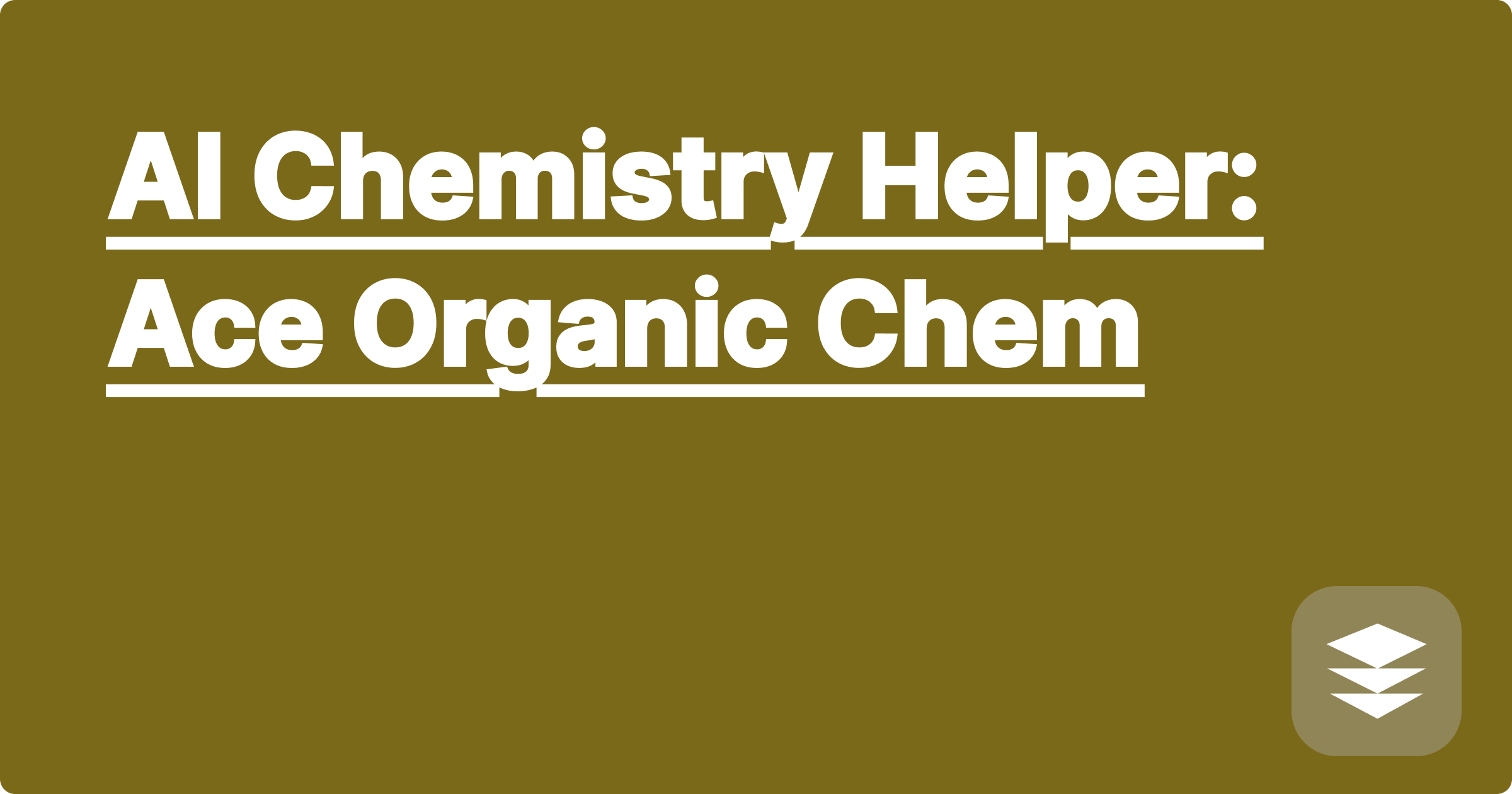
Navigating the complex world of organic chemistry can feel like traversing a dense jungle, filled with intricate pathways and hidden traps. Reactions, mechanisms, and nomenclature can overwhelm even the most dedicated STEM students. For many, organic chemistry becomes a significant hurdle in their academic journey, often leading to frustration and a sense of being lost. But what if there was a way to illuminate this challenging landscape, a guide to help you navigate the complexities and emerge with a deeper understanding? Artificial intelligence (AI) is rapidly transforming the educational landscape, offering powerful tools to personalize learning and accelerate research. This blog post explores how AI, specifically tailored for organic chemistry, can be your personal tutor, research assistant, and study buddy, empowering you to ace organic chem and unlock your full potential in STEM.
This isn't just about getting better grades; it's about fostering a genuine understanding of the subject matter. By leveraging AI's capabilities, you can move beyond rote memorization and delve into the underlying principles that govern organic reactions and molecular interactions. Whether you're struggling with basic concepts or aiming to master advanced synthesis pathways, AI can provide the personalized support you need to succeed. This post will introduce you to a range of AI tools, from well-known platforms like Wolfram Alpha to more specialized applications designed specifically for chemistry, and show you how to integrate them into your study routine for maximum impact.
Organic chemistry presents a unique set of challenges for students. The sheer volume of information, including complex reaction mechanisms, diverse functional groups, and intricate stereochemistry, can be daunting. Traditional learning methods often rely on memorization, which can be ineffective and lead to a superficial understanding of the subject. Furthermore, applying these concepts to problem-solving requires a deep understanding of the underlying principles, something that many students struggle to achieve. The abstract nature of organic chemistry, coupled with the need for spatial reasoning and visualization, further complicates the learning process. For researchers, the challenge lies in efficiently sifting through vast amounts of literature, designing experiments, and analyzing complex data. These challenges can significantly hinder progress and limit the ability to explore new frontiers in chemical research.
AI offers a transformative approach to tackling these challenges. Imagine having a personalized tutor available 24/7, capable of answering your questions, explaining complex concepts, and providing tailored practice problems. That's the power of AI tools like ChatGPT and Wolfram Alpha. ChatGPT can be used to break down complex reaction mechanisms step-by-step, providing clear explanations and addressing specific points of confusion. Wolfram Alpha excels at solving chemical equations, predicting reaction products, and providing detailed information on molecular properties. Furthermore, specialized AI tools like ChemDraw and MarvinSketch allow you to draw and visualize molecules, explore 3D structures, and predict their properties. By integrating these tools into your workflow, you can transform your learning experience and accelerate your research.
Let's walk through a practical example of using AI to solve an organic chemistry problem. Suppose you're trying to understand the mechanism of the SN1 reaction. You can start by asking ChatGPT to "explain the SN1 reaction mechanism in detail." ChatGPT will provide a step-by-step breakdown of the reaction, including the formation of the carbocation intermediate and the subsequent nucleophilic attack. You can then use Wolfram Alpha to explore the properties of the reactants and products, gaining a deeper understanding of the factors that influence the reaction rate. Finally, you can visualize the reaction mechanism in 3D using MarvinSketch, enhancing your spatial understanding of the process. This integrated approach allows you to move beyond rote memorization and develop a true understanding of the underlying chemical principles.
Consider another scenario where you need to synthesize a specific organic compound. You can use AI-powered retrosynthesis tools like Synthia to predict possible synthetic pathways. These tools analyze the target molecule and suggest a series of reactions that can be used to construct it from readily available starting materials. This can significantly reduce the time and effort required for experimental design and optimization. For instance, if you’re tasked with synthesizing ibuprofen, inputting the structure into Synthia will yield several potential synthetic routes, complete with reaction conditions and estimated yields. You can then use this information to guide your experimental work, maximizing your chances of success. Similarly, AI-powered tools can be invaluable for analyzing spectroscopic data. Tools like ACD/Labs software can help interpret NMR and IR spectra, identifying functional groups and elucidating molecular structures.
To maximize the benefits of AI in your STEM studies, consider implementing these strategies. First, integrate AI tools into your regular study routine. Use ChatGPT for clarifying concepts, Wolfram Alpha for solving problems, and specialized chemistry software for visualization and analysis. Second, actively engage with the AI tools. Don't just passively receive information; ask questions, explore different scenarios, and challenge the AI's responses. Third, combine AI-powered learning with traditional study methods. Use textbooks and lecture notes to build a foundational understanding, then use AI tools to deepen your knowledge and apply it to problem-solving. Finally, don't be afraid to experiment with different AI tools and find what works best for you.
The integration of AI into STEM education and research is not just a trend; it's a paradigm shift. By embracing these powerful tools, you can unlock new levels of understanding, accelerate your learning, and achieve your academic goals. Start exploring the world of AI-powered chemistry today, and witness the transformative impact it can have on your STEM journey. Don’t be left behind; embrace the future of learning and research.